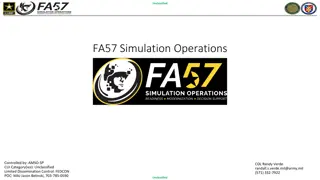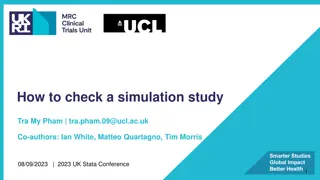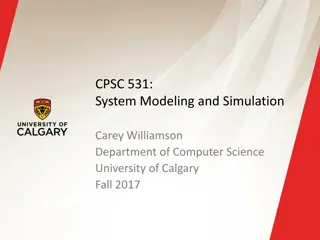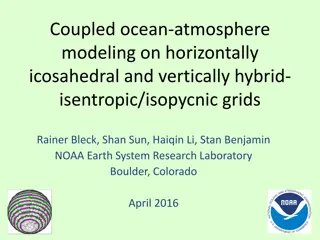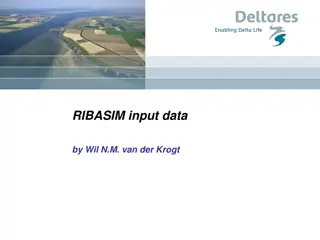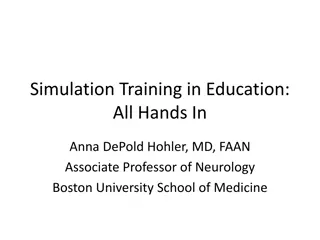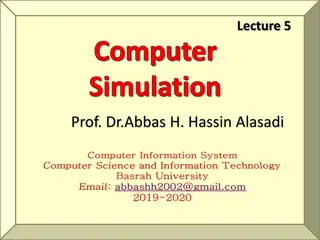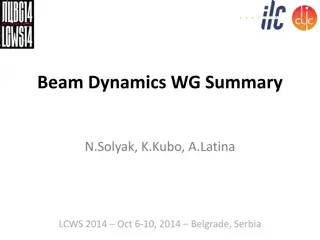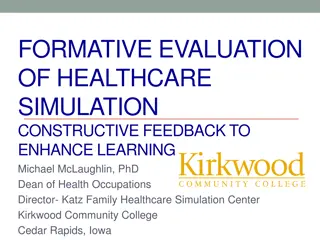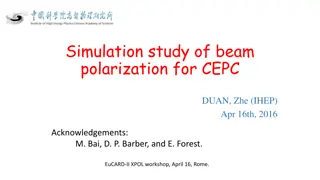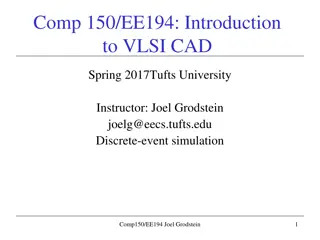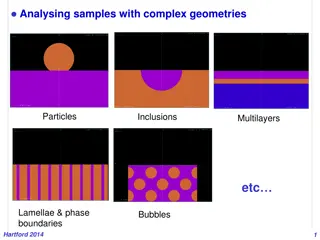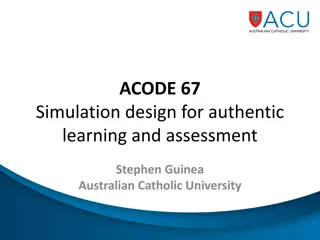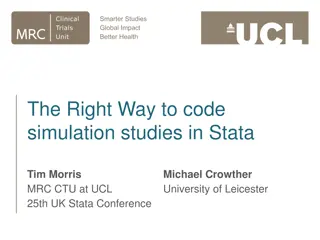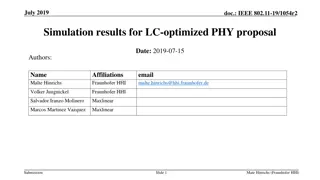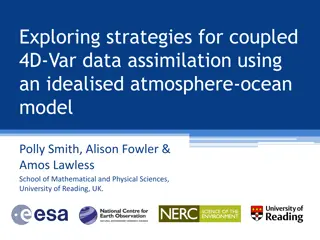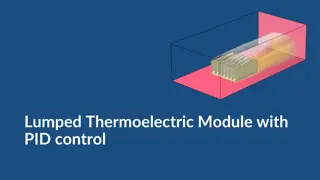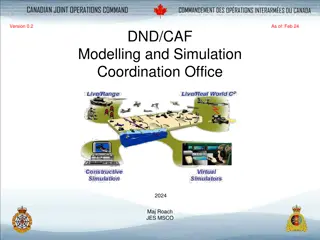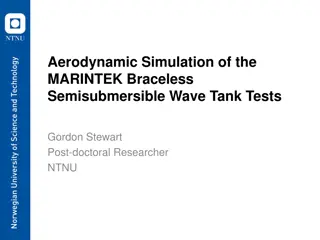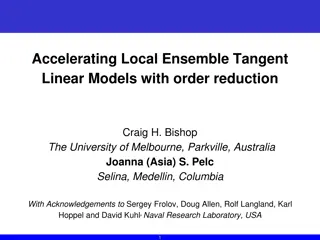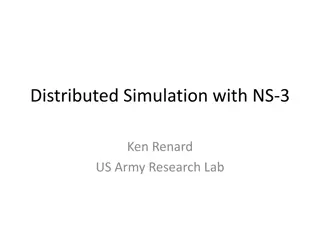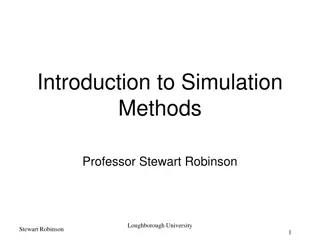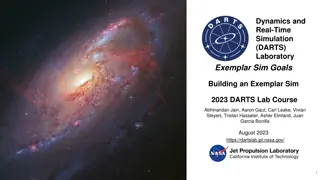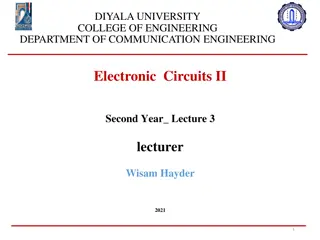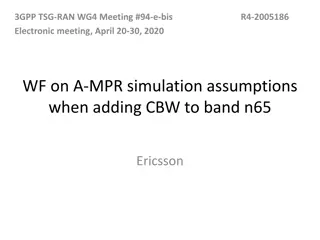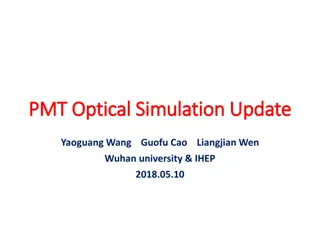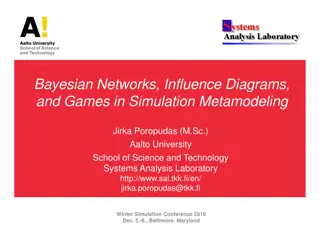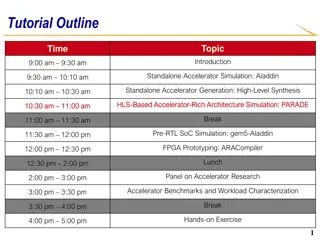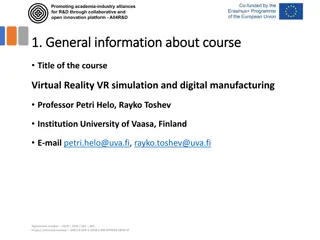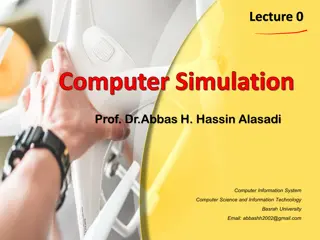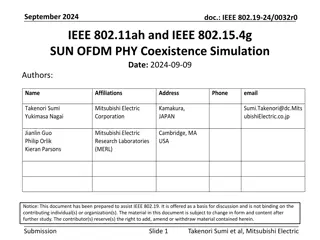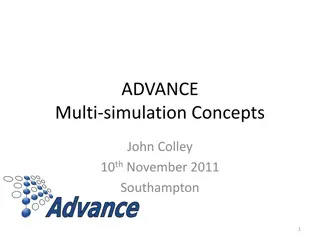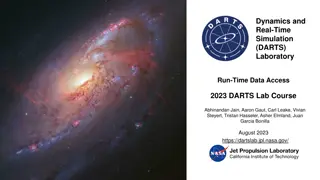System Modeling and Simulation Course Overview
This course covers the basics of systems modeling, discrete-event simulation, and computer systems performance evaluation. Topics include Monte Carlo simulation, probability models, simulation output analysis, queueing theory, and more. Professor Carey Williamson leads the course with a focus on pra
5 views • 21 slides
Overview of Army Modeling and Simulation Office
The U.S. Army Modeling and Simulation Office (AMSO) serves as the lead activity in developing strategy and policy for the Army Modeling and Simulation Enterprise. It focuses on effective governance, resource management, coordination across various community areas, and training the Army Analysis, Mod
2 views • 8 slides
How to Check a Simulation Study: Methods and Considerations
Simulation studies are often used to evaluate statistical methods and study power, but they can sometimes produce misleading results. This work discusses strategies to assess and improve the quality of simulation studies, drawing on experiences and considerations outlined in relevant literature. A s
0 views • 31 slides
Monte Carlo Transport Simulation
Monte Carlo simulation is a stochastic technique that uses random numbers and probability statistics to investigate and solve problems. In the context of transport simulation, a Monte Carlo program simulates the passage of particles through matter, involving geometry, transport, visualization, detec
2 views • 11 slides
System Modeling and Simulation Overview
This content provides insights into CPSC 531: System Modeling and Simulation course, covering topics such as performance evaluation, simulation modeling, and terminology in system modeling. It emphasizes the importance of developing simulation programs, advantages of simulation, and key concepts lik
1 views • 28 slides
Coupled Ocean-Atmosphere Modeling on Icosahedral Grids
Coupled ocean-atmosphere modeling on horizontally icosahedral and vertically hybrid-isentropic/isopycnic grids is a cutting-edge approach to modeling climate variability. The design goals aim to achieve a global domain with no grid mismatch at the ocean-atmosphere interface, with key indicators such
3 views • 21 slides
Basin Manipulation Simulation Analysis Tool Overview
Basin Manipulation Simulation Analysis Tool provides a comprehensive solution for managing and analyzing basin data, including tasks like basin manipulation, simulation analysis, case management, and defining simulation time steps. The tool allows for easy data entry, visualization of simulation res
6 views • 17 slides
Simulation Training in Education: Enhancing Learning Through Hands-On Simulation
Hands-on simulation training in education provides students with valuable learning experiences by increasing self-reported knowledge and technical proficiency. Simulations help improve students' knowledge, experience, and comfort with challenging procedures in a lower-risk environment, leading to en
0 views • 13 slides
Computer Simulation and Modeling Tools
Computer simulation and modeling is essential for conducting studies in various fields. Selecting the right simulation language or package is crucial for accurate results. This involves considering the characteristics of the language, such as random number generation, process transformers, list proc
2 views • 7 slides
Advanced Beam Dynamics and Machine Protection in High-Energy Linacs
Overview of recent talks and discussions at LCWS 2014 in Belgrade, Serbia, focusing on machine protection, simulation codes, instrumentation, and system tests. Topics include beam-loss monitors, dark current measurements, simulation code developments, and beam dynamics studies in linacs. Key speaker
1 views • 12 slides
Enhancing Healthcare Simulation Through Constructive Feedback
Explore the principles and benefits of healthcare simulation, focusing on formative evaluation and constructive feedback to improve learning outcomes. Delve into the role of formative assessment tools, TeamSTEPPS model, and Mayo High Performance Teamwork Scale in simulation scenarios. Discover the s
1 views • 37 slides
Beam Polarization Simulation Study for CEPC
Simulation study on beam polarization for the Circular Electron Positron Collider (CEPC) using the PTC Poly- morphic Tracking Code. The study includes orbital and spin tracking, equilibrium polarization calculation, and Monte-Carlo simulation of depolarization rate. Comparison with other Monte-Carlo
2 views • 20 slides
Introduction to VLSI CAD and Discrete-Event Simulation at Tufts University
This course introduces students to event-oriented simulation, building virtual models, and validating designs through simulation. It covers the importance of simulation in testing and refining designs before implementation. Examples include simulating VLSI networks and exploring the use of discrete-
1 views • 32 slides
Advanced Simulation Techniques for Analyzing Samples with Complex Geometries
Explore the capabilities of PENELOPE simulation software for analyzing samples with intricate structures like particles, inclusions, multilayers, lamellae, and phase boundaries. The software facilitates detailed investigations of material composition and electron-photon transport in diverse geometri
1 views • 28 slides
Simulation Design for Authentic Learning and Assessment at ACU
Simulation design for authentic learning and assessment is a crucial aspect of education, particularly in the healthcare field. At the Australian Catholic University (ACU), simulation plays a significant role in providing students with authentic experiences that bridge the gap between theory and pra
0 views • 18 slides
The Right Way to Code Simulation Studies in Stata
Simulation studies in Stata involve using (pseudo) random numbers to generate data from a distribution for studying statistical methods. This process helps to evaluate different scenarios and understand the properties of statistical techniques. Key components like ADEMP (Aims, Data-generating mechan
5 views • 18 slides
Simulation Results for LC-Optimized PHY Proposal in July 2019
The document presents simulation results for an LC-optimized PHY proposal for TGbb based on G.9991 PHY. It includes details on the simulation setup, frame detection results, header modulation, coding simulation results, payload modulation, and coding simulation results. The setup involved various re
1 views • 18 slides
Strategies for Coupled 4D-Var Data Assimilation in an Idealised Atmosphere-Ocean Model
This study delves into the exploration of strategies for coupled 4D-Var data assimilation using an idealised atmosphere-ocean model. It discusses the challenges, benefits, and methods involved in transitioning towards coupled data assimilation systems, particularly focusing on the imbalance at the i
1 views • 18 slides
Thermoelectric Module with PID Control Simulation
This simulation showcases a lumped thermoelectric module with PID control. The model evaluates the performance of a thermoelectric element in a nonisothermal fluid flow around a heat sink. A stationary simulation assesses the module's capabilities, followed by a transient simulation with a PID contr
1 views • 7 slides
Defense Modeling and Simulation Coordination Office Overview
The Defense Modeling and Simulation Coordination Office (DND/CAF MSCO) is responsible for managing contractors, policies, and strategic activities related to modeling and simulation within the Canadian Armed Forces. The office focuses on supporting various organizations and enhancing capabilities th
2 views • 6 slides
Aerodynamic Simulation of MARINTEK Braceless Semisubmersible: Insights and Tools
Explore the aerodynamic simulation of the MARINTEK Braceless Semisubmersible through advanced techniques and tools. Discover the unique aerodynamic actuator, simulation models, and tools used in the research conducted by Gordon Stewart, a post-doctoral researcher at NTNU. Gain insights into the expe
0 views • 16 slides
Simulation Types for Ecosystem Modeling
Exploring different simulation types such as continuous and discrete event simulations for modeling complex systems like ecosystems. Detailed discussion on creating an ecosystem simulation with fish and bears on a grid, showcasing actions like breeding, moving, eating, and dying. Overview of a World
0 views • 31 slides
Accelerating Local Ensemble Tangent Linear Models
This research focuses on accelerating Local Ensemble Tangent Linear Models with order reduction, exploring methods, results, and implications for advancing numerical modeling in atmospheric and oceanic systems. The study addresses challenges in maintaining accurate TLMs and adjoints for coupled mode
0 views • 21 slides
Distributed Simulation with NS-3
Explore the world of distributed simulation with NS-3 as presented in "Distributed Simulation with NS-3" by Ken Renard from the US Army Research Lab. Get insights into the application of NS-3 in creating advanced simulations for military research and beyond. Dive into the details of distributed simu
0 views • 38 slides
Introduction to Simulation Methods by Professor Stewart Robinson
This content delves into the world of simulation methods as presented by Professor Stewart Robinson from Loughborough University. It covers the basics of simulation, its importance, different approaches, and real-world examples showcasing its practical applications in industries like aviation and au
0 views • 19 slides
OR Teamwork Faculty Development Program
Center for Medical Simulation's program focuses on improving teamwork in operating rooms to enhance patient safety. The initiative aims to train interprofessional teams using simulation as a medium, positively influencing the OR's working culture. Supported by an insurance incentive from Harvard CRI
0 views • 12 slides
Real-Time Simulation Executive for DARTS Lab Course
The Dynamics and Real-Time Simulation (DARTS) Laboratory is developing an exemplar simulation executive for their 2023 course. The simulation aims to create a dynamic vehicle assembly, set up data logging, run simulations in real-time, and render related models. The project outlines requirements, go
0 views • 42 slides
Building an Exemplar Simulation with DARTS Laboratory - 2023 Course
Explore the goals and motivations behind the Exemplar Simulation being developed at the DARTS Laboratory in August 2023. Dive deep into the architecture concepts, simulation requirements, and the reference problem involving a quadcopter vehicle. This course focuses on creating a full-up simulation s
0 views • 9 slides
RC Coupled Transistor Amplifier: Operation and Gain Considerations
Learn about RC coupled transistor amplifiers, a cost-effective solution offering high audio fidelity across a wide frequency range. Explore how cascaded stages amplify signals and understand the impact on overall gain. Discover the biasing network, coupling capacitors, and operation of RC coupled am
0 views • 19 slides
Symbolic Algebra, Dispersion Matching, and Coupled Oscillators in MATLAB/Python
Explore the concepts of symbolic algebra, dispersion matching, and coupled oscillators in the context of accelerator physics. Learn about transverse focusing, dispersive transfer matrices, Chasman Green double-bend achromats, and coupled oscillator systems. Gain insights into solving complex equatio
0 views • 10 slides
A-MPR Simulation Assumptions for Adding CBW to Band n65 Ericsson
Explore the A-MPR simulation assumptions for incorporating Channel Bandwidth (CBW) into Band n65 Ericsson, including background contributions, discussions on simulation results, and measurement confirmations for band protections. Details on new specifications, simulation parameters, and consideratio
0 views • 6 slides
Advanced PMT Optical Simulation Update and Comparison
Explore the latest developments in PMT optical simulation, including an introduction of a new model and comparison with existing models. Learn about the simulation procedures, photon interactions, angle responses, and simulation methods involved in optimizing PMT performance. Stay informed on the fu
1 views • 12 slides
Simulation Metamodeling with Dynamic Bayesian Networks
Explore the innovative use of Dynamic Bayesian Networks in Simulation Metamodeling for Decision Analysis and Multiple Criteria Evaluation, presented in Jirka Poropudas' thesis at Aalto University. The thesis delves into Bayesian Networks, Influence Diagrams, and Game Theory to enhance simulation mod
0 views • 18 slides
Accelerator-Rich Architecture: Research Tools and Simulation Techniques
Explore a comprehensive agenda covering various aspects of accelerator-rich architecture, from standalone simulation to FPGA prototyping. Key topics include Aladdin simulation, High-Level Synthesis (HLS) generation, PARADE architecture simulation, gem5-Aladdin SoC simulation, and more. Join the disc
0 views • 29 slides
Develop Computer Simulation Models for Virtual Reality and Digital Manufacturing
Explore the Virtual Reality (VR) simulation and digital manufacturing course offering an introduction to production systems simulation, process modeling, and decision-making skills development. Targeted towards Bachelor and Master students with prerequisites in Computer Aided Design (CAD) and Produc
1 views • 5 slides
Introduction to Computer Modeling and Simulation for Graduate Students
This course overview provides insights into computer modeling and simulation for graduate students in various disciplines. It covers the importance of system modeling, analytical skills development, and practical applications. With a focus on scientific thinking and experimentation, students will ex
0 views • 21 slides
Understanding Simulation: Types, Advantages, and Disadvantages
Explore the concept of simulation, its types like Discrete Event, Dynamic, and Process Simulation, along with the advantages and disadvantages it offers. Learn how simulation allows for testing different scenarios without directly impacting systems, helping in decision-making processes.
0 views • 6 slides
IEEE 802.19-24 Simulation Update for Coexistence of IEEE 802.15.4g and IEEE 802.11ah
Explore the simulation update for the coexistence of IEEE 802.15.4g and IEEE 802.11ah in the September 2024 document. The study focuses on smart utility use cases, presenting simulation parameters, performance metrics, and the background of the study. Dive into the details of simulation models, depl
1 views • 14 slides
Advanced Multi-Simulation Concepts for Efficiency
Learn about multi-simulation principles, discrete event simulation, component views, simulation algorithms, and component evaluations to enhance efficiency in modeling complex systems.
0 views • 38 slides
Understanding DARTS Lab: Simulation Objects, Data Access, and DVar Layer
Explore the Dynamics and Real-Time Simulation (DARTS) Laboratory's run-time data access, simulation objects, DVar documentation, and the importance of the DVar layer in providing standardized access to rich data for simulation objects. Discover the significance of this layer in decoupling services f
0 views • 21 slides

